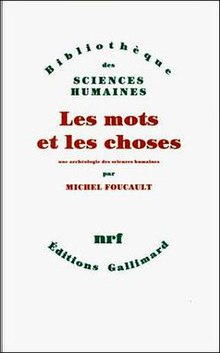The Order of Things

Cover of the French edition
|
|
| Author | Michel Foucault |
|---|---|
| Original title | Les Mots et les choses |
| Country | France |
| Language | French |
| Subject | Human science |
| Published |
|
| Media type | Print (hardcover and paperback) |
| Pages | 404 |
| ISBN | |
| OCLC | 256703056 |
The Order of Things: An Archaeology of the Human Sciences (French: Les mots et les choses: Une archéologie des sciences humaines) is a 1966 book by the French philosopher Michel Foucault. It was translated into English and published by Pantheon Books in 1970. (Foucault had preferred L'Ordre des Choses for the original French title, but changed the title because it had been used by two structuralist works published immediately prior to Foucault's).
Foucault endeavours to excavate the origins of the human sciences, which have their root in "life, labour, and language", that is: biology, economics, and linguistics. The book opens with an extended discussion of Diego Velázquez's painting Las Meninas and its complex arrangement of sightlines, hiddenness, and appearance. Then it develops its central claim: that all periods of history have possessed certain underlying epistemological assumptions that determined what was acceptable as, for example, scientific discourse.
Foucault develops the notion of episteme, and argues that these conditions of discourse have changed over time, from one period's episteme to another. Foucault demonstrates parallels in the development of three fields: linguistics, biology, and economics.
The key concept of the book is that various periods of history have been characterized by a certain number of conditions of truth or discourse which are common to various areas of knowledge and determine what it is possible or acceptable to affirm, and that these have been subject to change over time. Foucault analyzes shifts in the paradigm of thought between the classical and modern periods:
Foucault references three epistemes :
Within the classical episteme, Foucault claims that the concept of "man" was not yet defined; certainly man was spoken of, but not subject to a distinct epistemological awareness.
Foucault's critique has been influential in the field of cultural history. The various shifts in consciousness that he points out in the first chapters of the book have led several scholars, such as Theodore Porter, to scrutinize the bases for knowledge in our present day as well as to critique the projection of modern categories of knowledge onto subjects that remain intrinsically unintelligible, in spite of historical knowledge.
...
Wikipedia
